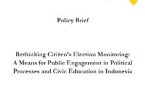 The case of Tajul Muluk in Indonesia illustrates the problems of judicial protection for a religious minority when dealing with a blasphemy case. When applying blasphemy law in cases involving a religious minority, the court uses the exclusionary standard to examine the validity of the religion belonging to the minority group. As a consequence, however, this application becomes prejudicial by undermining religious minorities equality to enjoy religious freedom and rendering their rights vulnerable to discriminatory legal norms.
The case of Tajul Muluk in Indonesia illustrates the problems of judicial protection for a religious minority when dealing with a blasphemy case. When applying blasphemy law in cases involving a religious minority, the court uses the exclusionary standard to examine the validity of the religion belonging to the minority group. As a consequence, however, this application becomes prejudicial by undermining religious minorities equality to enjoy religious freedom and rendering their rights vulnerable to discriminatory legal norms.
Researcher: Muktiono
Download/view:
Topic: Religious Freedom, Human Rights






